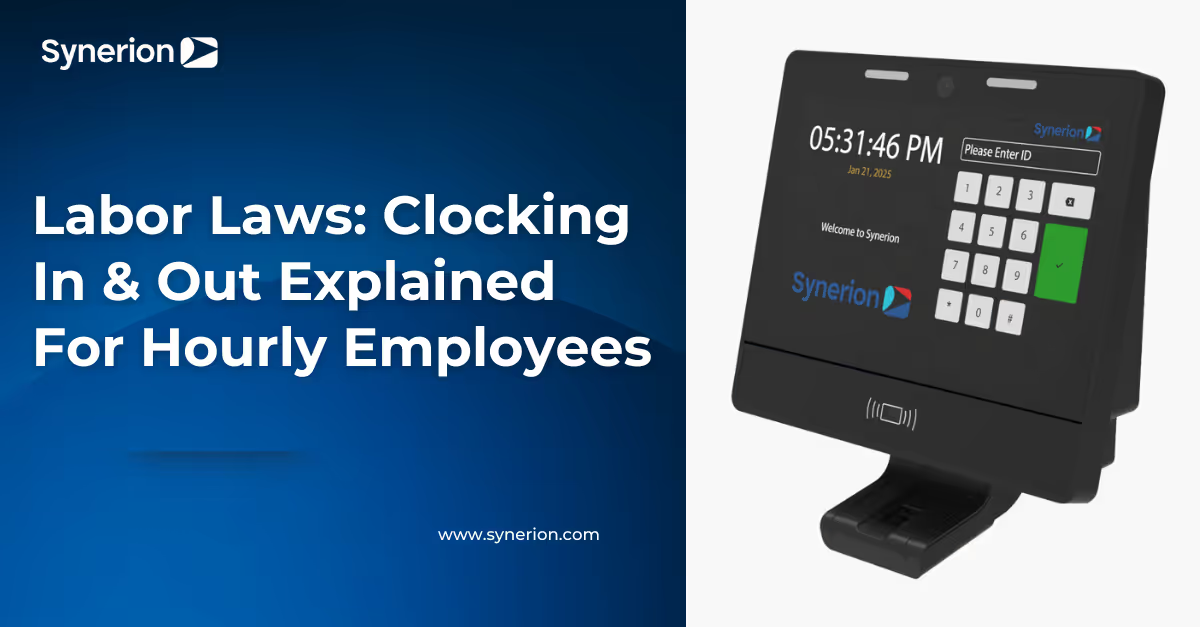
Labor Laws: Clocking In & Out Explained For Hourly Employees

Whether you're managing a team or clocking in for your shift, accurate time tracking matters. Labor laws around clocking in and out exist to protect both employers and employees, ensuring fair pay, consistent scheduling, and compliance with complex wage regulations.
Understanding these rules helps businesses avoid costly penalties and gives employees confidence that every minute worked is properly recorded and paid.
Main Takeaways:
- Federal labor laws require accurate clocking in and out for all hours worked, including overtime and short tasks before or after shifts
- Breaks under 20 minutes are paid, while meal periods can be unpaid if you're fully relieved of duties, but working during any break must be compensated.
- States like California, New York, and Washington have stricter requirements for breaks, overtime, and recordkeeping
- Off-the-clock work, missed breaks, improper rounding, and manual errors can lead to steep penalties and lawsuits
- Automated time tracking systems help enforce correct clock-in, clock-out policies, apply complex labor laws, and maintain audit-ready records to simplify compliance
Federal Labor Laws: Clocking In and Out Explained
The Fair Labor Standards Act (FLSA) requires employers to track and pay for all hours worked by non-exempt employees. Clocking in and out creates a record of your work time that ensures you receive proper payment.
The Federal law mandates that employers pay for every minute you work, including overtime for hours beyond 40 in a workweek. This applies whether you're punching in at work through a time clock, mobile app, or computer system.
Time clock rules for hourly employees are clear: all work must be compensated. This includes activities before or after your shift, like setup or cleanup.
Should salaried employees clock in and out? If you're classified as "exempt," you're typically not required to track hours, but your employer may still implement a clock-in clock-out policy for attendance or project tracking purposes.
Break, Wage, and Overtime Requirements

Federal law under the Fair Labor Standards Act (FLSA) does not require employers to provide rest or meal breaks, but when employers choose to offer them, specific pay rules apply:
- Short rest breaks (typically 5–20 minutes): Must be counted as paid working time.
- Meal periods (usually 30 minutes or more): May be unpaid only if the employee is completely relieved of all work duties during the break.
If an employee performs any work during a meal period—even something small like checking an email or answering a quick call—that time must be paid. Many employers use automated time tracking systems to ensure accurate recording of rest and meal periods.
Under federal law, overtime pay is required at 1.5 times the employee's regular rate for all hours worked over 40 in a workweek.
Some states have stricter overtime and break requirements.
- California, for example, mandates overtime pay after 8 hours in a single day and double time after 12 hours, along with mandatory meal and rest breaks based on shift length.
- Other states, such as Colorado, Oregon, and Washington, have additional or different break and overtime rules.
Mandatory Record keeping Requirements

Under the Fair Labor Standards Act (FLSA), employers must maintain specific payroll and timekeeping records for each non-exempt employee. These records must be complete, accurate, and accessible for inspection by the U.S. Department of Labor (DOL).
Required records include:
- Employee's full name and identifying information
- Daily and weekly hours worked
- Regular hourly rate of pay
- Total straight-time and overtime earnings for each workweek
- Total additions to or deductions from wages
- Total wages paid each pay period
- Date of payment and the pay period covered
Retention requirements:
- Three years for payroll records such as wage rates, total pay, and hours worked
- Two years for supporting documents, including time cards, work schedules, and wage computation records
Employers must make these records available for DOL review upon request. Incomplete, inaccurate, or missing records can result in penalties and make it difficult to defend against wage claims.
State-Specific Timekeeping Requirements
While federal law sets the baseline, state laws often add extra protections. You need to follow the stricter standard when federal and state laws differ.
California
California has the nation's most rigorous requirements for clocking in and out. This includes:
- Overtime after 8 hours in a day (not just 40 in a week)
- Double-time after 12 hours in a day
- California law requires employers to provide a 30-minute meal break for employees working longer shifts.
- Required 10-minute rest breaks for every 4 hours worked.
- Employees may be entitled to additional compensation if required breaks are missed, depending on state law.
New York
New York has specific meal period requirements:
- 30-minute lunch break for shifts over 6 hours spanning noontime
- Certain shift schedules may require longer meal periods, especially when work spans early mornings and late evenings.
- Record retention for 6 years (longer than federal requirement)
Washington
Washington state emphasizes break compliance:
- 10-minute paid rest break for every 4 hours worked
- 30-minute meal period for shifts over 5 hours
- Strict enforcement against automatic meal deductions when breaks aren't taken
Other states like Illinois, Oregon, Massachusetts, and Colorado have their own unique requirements. Multi-state employers must configure their time tracking systems to handle these variations.
Common Compliance Pitfalls and Penalties

Even well-intentioned employers can face compliance risks if time tracking, overtime, or break policies aren't enforced correctly. Understanding these common mistakes and their potential penalties is essential to preventing costly violations.
Time Tracking Violations
Off-the-clock work is a major compliance risk. This happens when:
- Employees work before clocking in or after clocking out
- Managers adjust time records to reduce hours
- Systems automatically deduct breaks that weren't actually taken
Employees must always punch in before starting any tasks and clock out after completing all work. This includes preparation time and cleanup.
Rounding Practices
Under federal law, the Fair Labor Standards Act (FLSA) allows employers to round employee time entries to the nearest five minutes, one-tenth of an hour (6 minutes), or quarter hour (15 minutes)—but only if the rounding method is neutral and applied consistently. In practice, this means the rounding must not always favor the employer; over time, it should average out fairly for both employers and employees.
Examples of compliant quarter-hour rounding:
- 8:07 AM arrival → rounded to 8:00 AM
- 8:08 AM arrival → rounded to 8:15 AM
- 5:53 PM departure → rounded to 5:45 PM
- 5:54 PM departure → rounded to 6:00 PM
Employers must still pay for all time actually worked, even small amounts, if the employee regularly performs work before clocking in or after clocking out.
In California, courts have increasingly ruled against rounding practices in favor of exact, minute-by-minute time tracking—especially when accurate digital systems make precise tracking feasible. Cases such as Troester v. Starbucks Corp. (2018) and Camp v. Home Depot (2022) have reinforced that even small amounts of unpaid time can violate state wage laws.
Break and Overtime Violations
Missing required breaks can be costly. In California, each missed meal or rest break requires one extra hour of pay as a penalty.
Overtime miscalculations often occur when:
- Bonuses aren't factored into the regular rate
- Work across multiple locations isn't combined
- Clock-in clock-out policy isn't consistently enforced
Penalties For Noncompliance
Failing to comply with federal or state labor laws can lead to significant financial and legal consequences for employers. Common penalties include:
- Federal civil penalties of up to $1,000 per violation for repeated or willful recordkeeping and wage violations under the FLSA (and up to $10,000 for criminal convictions in severe or repeat cases).
- Back pay owed to all affected employees for unpaid wages, overtime, or missed breaks.
- Liquidated damages equal to the amount of unpaid wages in many cases, effectively doubling the cost of back pay.
- Attorney's fees and court costs, which employers are often required to cover when employees prevail.
- State-specific penalties, which may be stricter. For example, California can impose an additional $50 for the first pay period and $100 for each subsequent pay period per affected employee for wage statement or break violations.
Four Employer Best Practices for Compliance

Maintaining compliance requires clear, consistent policies, training your teams, and using reliable systems to ensure every rule is followed and documented.
1. Establish Clear Clock-In And Clock-Out Policies
Create a written policy that explains how employees should clock in and out, record breaks, and handle missed punches. Include overtime authorization procedures and consequences for policy violations. Review these rules regularly with staff to promote consistent, fair enforcement.
2. Train Employees and Managers
Conduct regular training so everyone understands timekeeping, break, and overtime requirements. Managers should receive additional guidance on approving timecards and handling edits correctly, since improper changes can create liability.
3. Audit And Document Regularly
Perform periodic reviews of timecards, schedules, and payroll records to confirm accuracy. Log reasons for manual edits or exceptions to maintain a clear audit trail. Consistent documentation not only prevents errors but also demonstrates good-faith compliance during inspections.
4. Use Technology for Compliance
Modern time and attendance systems automate many compliance tasks—such as biometric verification to prevent "buddy punching," mobile clock-ins with geofencing, break and overtime alerts, and automatic application of federal and state labor rules. These tools reduce manual oversight and ensure accuracy across your workforce.
Simplify Compliance With Synerion
Staying compliant with labor laws for clocking in and out protects both employees and employers. Synerion's time and attendance solutions automate compliance with both federal and state requirements.
Our system handles complex rules for breaks, overtime, and record keeping across multiple states. With biometric time clocks, mobile punch options, and real-time alerts, you can prevent violations before they occur.
Synerion's platform adapts to your specific needs, whether you're a single-location business or a multi-state enterprise. Our in-house implementation team ensures your system is configured correctly from day one.
Ready to simplify compliance and protect your business? Book a demo to see how Synerion can elevate your employees.
